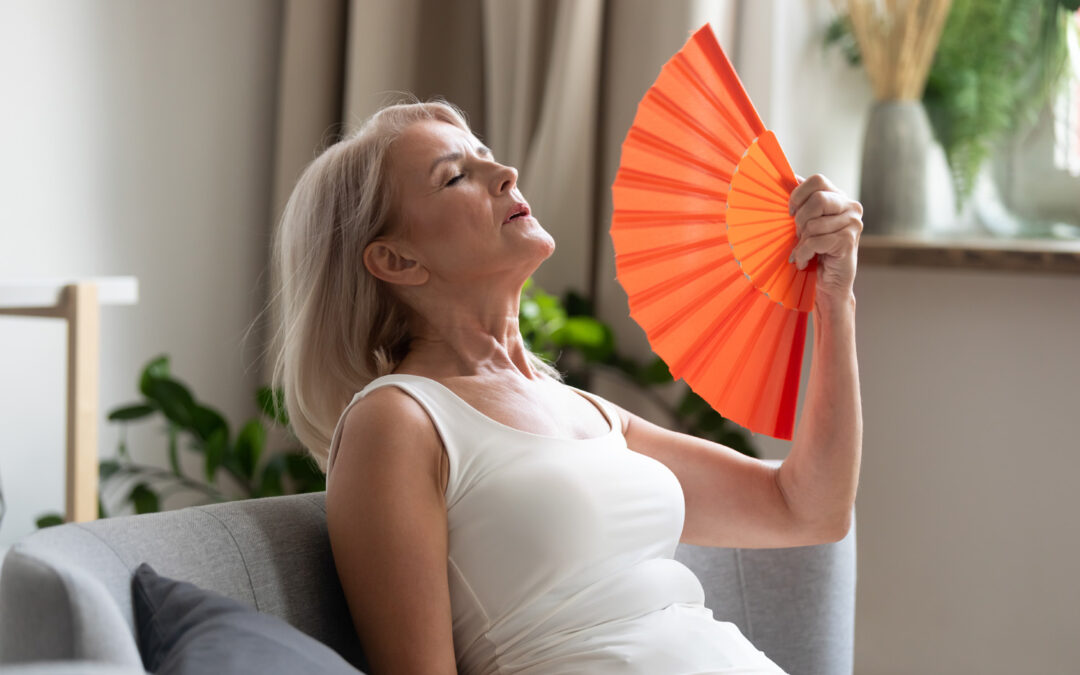Acupuncture treats the condition as a whole, alleviating all underlying symptoms of menopause.
Perimenopause and menopause mark the hormonal shift in a woman’s body that signals the end of reproductive capability. The levels of estrogen, progesterone, and testosterone begin to fluctuate and eventually plummet which then causes many different life-changing symptoms. When a woman’s ovaries run out of eggs to release, the symptoms begin. And when a woman goes for a full year without a menstrual cycle (initiated by the release of an egg), she has officially moved from perimenopause into menopause.
Symptoms vary from woman to woman. Some incredibly lucky women will never notice a thing aside from their missing menstrual cycle. Others experience years upon years of torturous symptoms that can affect their health and well-being.
Women can alleviate these symptoms through traditional treatment options such as Hormone Replacement Therapy (HRT) and vaginal estrogen as well as over-the-counter supplements. Lately, many OB-GYN’s are suggesting alternative therapies to menopausal women such as acupuncture.
Dr. Ko. from 120 Acupuncture says that when a woman enters menopause, her body is out of balance.
“In Oriental Medicine, the uterus is called the ‘Kidney腎’, and when menopause comes, the function of the ‘kidney’ is broken. In this case, the ‘kidney’ needs to be balanced with the large intestine because these organs are facing each other. Only Dr.Ko can perform this kind of treatment.“
Dr. Ko stresses that it’s important for your acupuncturist to know if you’re menopausal because there are a number of changes that occur in the body due to hormonal shifts, all of which need to be treated. These are the many symptoms of menopause, all of which can be treated by acupuncture by treating the varying symptoms as a whole. It’s a matter of balance. Dr. Ko says that “Balancing hormones is the most important part in the treatment of menopausal symptoms. If the hormones are balanced, all the various symptoms of menopause can be treated. A doctor should look at the whole and treat all of the symptoms as a whole.”
Menopause Symptoms and Treatments
- NHot Flashes
Hot flashes and night sweats are the number one life-disrupting symptoms felt by menopausal women. They’re caused by the fluctuation of estrogen and progesterone which affect the action of other hormones responsible for regulating body temperature.
- $How Acupuncture Helps
Acupuncture creates and sustains balance within the body. This balance extends to all systems including the endocrine system which is responsible for hormone production. A hormonal imbalance perpetuated by menopause causes hot flashes and night sweats. Acupuncture helps to restore balance and relieve symptoms.
- NInsomnia
Insomnia is reported in over half of all menopausal women. It’s caused by the reduction of progesterone which is a sleep-producing hormone. It’s also a secondary symptom caused by hot flashes (primary symptom) which cause adrenaline surges in the body. Adrenaline prevents sleep.
- $How Acupuncture Helps
Acupuncture helps to relieve hot flashes as described above which will, in turn, help to alleviate the rise in adrenaline which prevents sleep. In the same vein, acupuncture restores balance to the endocrine system where progesterone is produced.
- NFatigue
Fatigue is a two-fold response to menopause. The hormone imbalance directly leads to that overpowering sensation of exhaustion in the body. This is exacerbated by insomnia that most menopausal women experience. It is a symptom that is amplified by another symptom.
- $How Acupuncture Helps
By restoring balance to the endocrine system, acupuncture can help alleviate insomnia felt by menopausal women. Acupuncture is also used to treat fatigue separately by restoring balance to the yin and yang energies – calming the yang and stimulating the yin.
- NMood Swings
Mood swings follow women through life and always occur during times of hormone fluctuations: puberty, the menstrual cycle, and menopause. Though the correlation isn’t directly clear on how mood is actually affected, it is clear that hormones are involved.
- $How Acupuncture Helps
Because mood swings can be caused by a number of different factors such as stress, depression, drugs, and hormones, it is important to explain to your acupuncture practitioner if you’re experiencing menopause in relation to your mood swings. When this is known, the acupuncturist can work to restore the hormone balance that is most likely causing the mood swings.
- NBrain Fog
Brain fog, a performance dip in cognitive function and memory, is real and researchers at Brigham and Women’s Hospital, Massachusetts General Hospital, and Harvard Medical school conducted a study proving that estrogen level drops directly affect cognitive function. This can be a terrifying thought.
- $How Acupuncture Helps
There are a number of studies that prove beyond a doubt that acupuncture helps with mental clarity and cognitive disruptions by stimulating the neurocircuitry of patients. It improves the association between cognition, emotion, and brain networks within the body.
- NWaning Libido
Libido is driven by estrogen and testosterone, both of which are dramatically lowered in menopausal women. And other issues also lead to a decrease in sex drive, all of which are related to menopause, such as vaginal dryness and atrophy which lead to painful sex, weight gain, and mood swings.
- $How Acupuncture Helps
Acupuncture helps with libido through two main functions: by helping to bring balance to the hormonal system, and by improving circulation which increases blood flow around the reproductive organs.
Conclusion
Acupuncture and Oriental Medicine have the ability to significantly decrease menopausal symptoms on their own or paired with conventional therapies. Oriental Medicine alone will not be sufficient. According to Dr. Ko, menopausal symptoms can be alleviated by 70-80%.
If you are seeking relief from any or all of these symptoms from an acupuncturist, it is important to let your acupuncturist know if menopause may be a factor. This is because all of these symptoms can be caused by other underlying conditions. Knowing that a hormonal shift is the likely culprit will help your acupuncturist treat the root cause.







